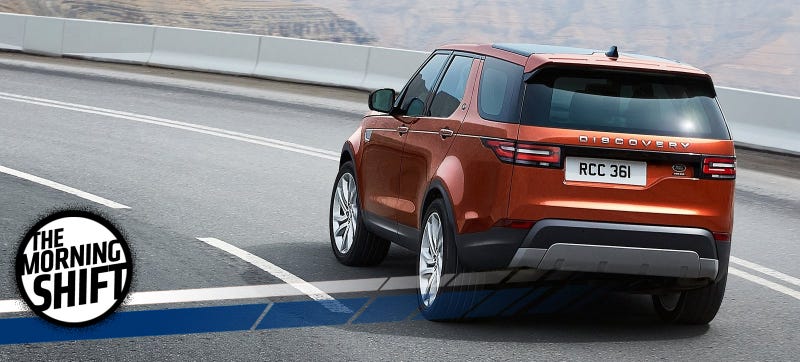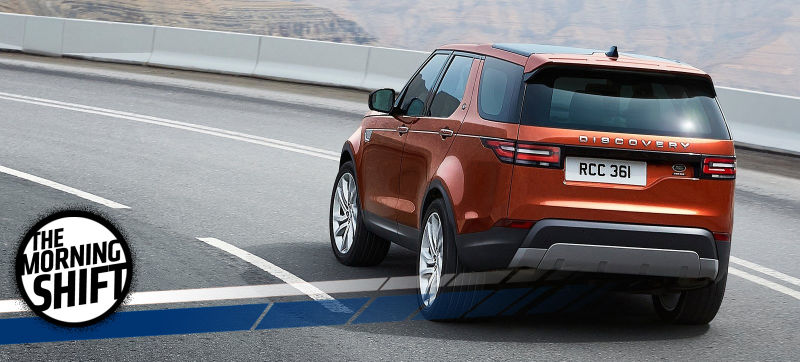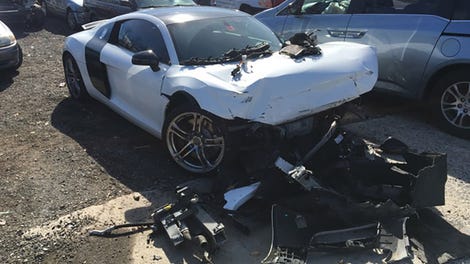
Good morning! Welcome to The Morning Shift, your roundup of the auto news you crave, all in one place every weekday morning. Here are the important stories you need to know.
Advertisement
1st Gear: What Did You Think Would Happen?
A few weeks back we calculated what could happen to the costs of Mexican-made vehicles if the Trump administration’s floated 20 percent border tax went into effect. Automotive News reports a new study looks at the effects even more closely, saying that if import tariffs went into effect—including all foreign-made cars, not just the ones built in Mexico—Jaguar Land Rover would be hit the hardest, with U.S. prices getting jacked up as much as $17,000 per vehicle.
The “domestic” automakers would fare a little better, the study says:
Advertisement
In what it calls a “thought exercise,” researcher Baum & Associates estimates most automakers would need to raise vehicle prices by thousands of dollars — more than $17,000 per vehicle in Jaguar Land Rover’s case, which imports all its vehicles — to recoup higher costs incurred by a proposed border-adjusted tax. Ford, with significant domestic manufacturing, would need to mull the smallest price hike among major automakers, at about $282 per vehicle, followed by General Motors at $995, according to the report.
The estimates aim to show the relative impact of the tax plan on each automaker, according to Alan Baum, the founder of Baum & Associates. Carmakers are unlikely to raise prices by more than a few thousand dollars per car and would also likely have to foot some of the higher tax burden.
“The plan results in a net cost for automakers,” Baum said by phone. “Each company will then make its own decisions on pricing in order to best compete and maximize its profits.”
Volvo and VW vehicle prices would have to rise by about $7,600 and $6,800 on average, according to estimates by Baum & Associates, which advises suppliers. President Donald Trump is said to be warming to the border-adjusted tax after initially viewing it as too complicated.
As we said in our story, import tariffs do little more than pass the cost onto consumers and probably eliminate the existence of some vehicles in the market at all. You think Volkswagen is gonna bother selling GTIs when the base MSRP shoots up by $7,600?
Advertisement
Sponsored
2nd Gear: Foreign Exchange
General Motors says its fourth quarter net income is down 14 percent year-over-year, which it promptly blamed on Brexit. Darn! Via Reuters:
Advertisement
GM said fourth-quarter net income fell to $1.8 billion, or $1.19 per share, from $6.3 billion, or $3.92 a share, a year earlier.
Excluding one-time items, GM earned $2.4 billion, or $1.28 a share, in the latest quarter, down 14 percent from a year earlier. The adjusted result beat analysts’ expectations of $1.17 per share.
GM forecast adjusted earnings per share for all of 2017 at $6.00 to $6.50 a share, compared with $6.12 for all of 2016. Shares were up 1.5 percent at $37.40 in premarket trading.
Most of the currency impact was caused by the decline in the value of the British pound after the United Kingdom’s vote to leave the European Union, GM said.
GM Chief Financial Officer Chuck Stevens said the company does not expect to break even in Europe this year, but will push to “get to that point in 2018.”
3rd Gear: Good News For Workers Though
As GM is set to do a “record” profit-sharing for its UAW members. Not bad. Via The Detroit News:
Advertisement
General Motors Co. said Tuesday nearly 52,000 UAW workers will receive record profit sharing checks of up to $12,000.
Payments could cost the automaker $624 million and are slated to arrive Feb. 24. Last year, GM-UAW members received $11,000 in profit sharing checks.
Profit sharing amounts are based on GM’s North America pre-tax profit, which set a record last year at $12.05 billion. GM-UAW hourly workers receive $1 for every $1 million earned.
4th Gear: Toyota’s Challenges
Advertisement
Toyota seems like an unstoppable giant that’s always going to do well, but the coming climate presents a lot of tough problems. There’s the declining demand for demands, a too-strong yen, and those pesky possible import tariffs hanging over their heads. Via Bloomberg:
Japan’s largest automaker expects profit to fall to 1.7 trillion yen ($15.1 billion) for the fiscal year ending next month, about a quarter less than the previous annual period. The forecast given Monday — still less than analysts’ consensus — reflects challenges including a stronger yen and flagging U.S. demand for passenger cars such as the Camry sedan.
Trump’s opposition to imported vehicles risks making company President Akio Toyoda’s job even more difficult. Toyota has invested about $22 billion in the U.S. and would likely need more than $1 billion and several years to add to the six plants it’s already built in politically conservative U.S. states. The company still imports a significant proportion of high-value components like engines and transmissions, said Takaki Nakanishi, the top-ranked auto analyst for six consecutive years through 2009 in rankings by Nikkei Veritas.
“Japan’s auto industry has not sufficiently localized operations in the U.S., its largest sales destination market,” Nakanishi, a Tokyo-based analyst for Jefferies Group LLC, wrote in a Jan. 30 report.
Toyota exports more cars to the U.S. from Japan, Canada and Mexico than rivals Honda and Nissan do, and while it makes a bazillion Camrys here a month, that’s not what people are buying right now. It stands to lose a lot from import tariffs. So why not just build more cars here? That has consequences too:
Advertisement
For Toyota, adding more production to the U.S. could be both politically fraught back in Japan and expensive. Koji Endo, an automotive analyst at SBI Securities in Tokyo, estimates that building more Lexus models in the U.S. would require a new plant that would cost as much as 150 billion yen ($1.3 billion).
“If Toyota wants to shift production even more to the U.S., it would probably have to close plants in Japan and fire people, and some suppliers might disappear,” Endo said.
5th Gear: Takata May Have A Buyer
An American buyer! That’ll straighten these jokers out. No more explosions on our watch. Via The Detroit Free Press:
Advertisement
Key Safety Systems Inc., headquartered in Sterling Heights, has been selected as the favored buyer for troubled airbag manufacturer Takata, according to several media reports.
Takata is nearing a decision on a buyer for the company, and it is leaning toward Key Safety Systems, the Wall Street Journal said, citing people familiar with the process. Reuters, on Friday, had a similar report.
Key Safety met with Takata, its steering committee, an investment banker and representatives from several automakers in Japan last week, according to a person familiar with the situation.
Reverse: RIP
Neutral: What’s A Toyota To Do?
Advertisement
Advertisement
Shift more production to the U.S.? Focus more on trucks and SUVs in hopes gas will stay cheap, like Fiat Chrysler is doing? Give the Camry four more inches of ride height and bigger tires and call it the Camry Cross Country?


















